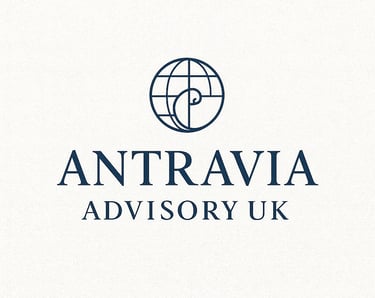Understanding your UK Company Dates - What they mean and why they matter
Learn what each UK company date means, from confirmation statements to annual accounts and Corporation Tax filings. Stay compliant and avoid penalties with Antravia UK’s clear guidance for travel and hospitality businesses.
TRAVEL FINANCE AND ACCOUNTING BLOG - U.K. FOCUS
10/24/20255 min read


Understanding your UK Company Dates - What they mean and why they matter
You’ve set up your limited company, received a list of official dates, and now you’re wondering what they all mean. What happens if you miss one? What needs to be filed when? These questions catch many directors by surprise.... and yet every date connects directly to your legal duties under the Companies Act 2006 and HMRC filing rules.
At Antravia UK, we work with travel agents, tour operators, and hotels who often overlook these compliance details in their first year of trading. The reality is that missing a simple Companies House or HMRC deadline can lead to penalties, a frozen bank account, or even your company being struck off.
This guide explains the key filing dates that apply to UK limited companies, how to stay compliant, and what happens if you fall behind.
Key takeaways
Missing your confirmation statement deadline is a breach of the Companies Act 2006 and can lead to penalties or company closure.
You must file annual accounts even if your company is dormant.
If you are trading, you must register for Corporation Tax within three months of starting business activity.
1. Confirmation statement dates
Every active UK limited company must file a confirmation statement each year. This is not a tax form, but it is a legal declaration to Companies House confirming that your company’s registered details are accurate and up to date.
When you incorporate, Companies House automatically sets your first confirmation date as the anniversary of your formation minus one day. You then have 14 days after that date to file your confirmation statement.
Example:
You register a company on 1 August 2025
The first confirmation statement date will be 31 July 2026
You must file by 14 August 2026
The next confirmation period will run from 1 August 2026 to 31 July 2027
You can file early if, for example, you need to update your shareholding or director details. Doing so resets the next review period from the new statement date.
What happens if you miss it?
Failing to file your confirmation statement is a criminal offence under the Companies Act 2006. Both the company and its directors can be fined up to £5,000 per officer, and the company can eventually be struck off the register.
Companies House will normally issue reminders, but it’s essential not to rely on them and the legal responsibility always sits with the director.
2. Annual account dates
Your annual accounts show the company’s financial position and must be filed with both Companies House and HMRC each year. Even if the company hasn’t traded, you still need to file a set of accounts, known as dormant company accounts.
Your accounting year ends on your accounting reference date (ARD), which is automatically set as the last day of the month in which you incorporated.
Example:
You register a company on 1 August 2025
Your accounting reference date becomes 31 August 2026
You must file your first set of accounts by 1 May 2027 (21 months after incorporation)
Subsequent accounts are due 9 months after each ARD
Changing your accounting date
You can change your accounting reference date if it makes financial sense, for example, to align with your parent company or to shorten your first financial year. However, doing so resets your reporting deadlines and may affect Corporation Tax alignment, so take professional advice before submitting the change through Companies House.
Penalties for missing the deadline
Late filing penalties increase the longer you delay. As of 2025:
Up to 1 month late – £150
1–3 months late – £375
3–6 months late – £750
More than 6 months – £1,500
If you’re late two years in a row, the penalty doubles. Persistent non-filing can lead to company strike-off and potential prosecution.
3. Corporation Tax and Company Tax Returns
If your company trades, you must register for Corporation Tax within three months of starting business activity. “Trading” includes invoicing, advertising, or taking payments and not just turning a profit.
Corporation Tax is paid on your company’s profits, and you must also submit a Company Tax Return (CT600) to HMRC.
The key deadlines are:
Register for Corporation Tax within 3 months of starting to trade
Pay Corporation Tax within 9 months and 1 day after your accounting period ends
File your Company Tax Return within 12 months of your accounting period end
Example:
Company formed on 1 August 2025
Trading starts on 1 August 2025
First accounting period for Corporation Tax runs 1 August 2025 – 31 July 2026
Corporation Tax must be paid by 1 May 2027
Company Tax Return due by 31 July 2027
If your accounting period doesn’t match your Companies House dates, you might need to file two tax returns in the first year, since HMRC doesn’t allow accounting periods longer than 12 months.
Penalties for late filing
HMRC applies a £100 fine as soon as a return is late. Further penalties increase depending on how long the delay lasts and whether it’s a repeat offence. Late payment of tax attracts interest and potential surcharges based on the unpaid amount.
4. Where to find your company dates
You can check your official deadlines directly on the Companies House register, which lists your confirmation statement and annual accounts due dates.
Companies House: https://find-and-update.company-information.service.gov.uk/
HMRC online services: accessible via your Government Gateway account, where you can view Corporation Tax deadlines and previous filings.
If your accountant manages your filings, ensure they have access to both systems and send you calendar reminders. Directors remain legally responsible even if someone else handles the submission.
5. Why this matters for travel and hospitality businesses
For UK travel agents, tour operators, and hotels, these filings connect directly to your financial credibility. Missing filings can:
Jeopardise your ATOL or ABTA membership renewal
Delay your ability to open merchant or FX accounts
Raise red flags during funding or due diligence checks
At Antravia UK, we manage these compliance timelines alongside your accounting cycle. We ensure your filings stay on schedule, your Companies House records align with HMRC, and your financial statements meet FRS 102 and sector requirements.


References
Companies Act 2006, Part 24 – Annual Returns and Accounts. https://www.legislation.gov.uk/ukpga/2006/46/contents
Companies House. Filing your confirmation statement. https://www.gov.uk/file-your-confirmation-statement
HM Revenue & Customs. Filing deadlines for company accounts and tax returns. https://www.gov.uk/prepare-file-annual-accounts-for-limited-company
HMRC. Corporation Tax for limited companies. https://www.gov.uk/corporation-tax


Disclaimer
This article is provided for general information purposes only and does not constitute accounting, tax, or legal advice. Regulations, tax rules, and reporting requirements may change, and their application can vary depending on your business structure and circumstances. Readers should seek professional guidance from a qualified accountant or adviser before making any financial, tax, or compliance decisions. Antravia UK accepts no responsibility for any loss arising from reliance on the information contained herein.
Antravia Advisory UK
Where Travel Meets Smart Finance
Email:
Contact us:
© 2025. All rights reserved. | Disclaimer | Privacy Policy | Terms of Use | Accessibility Statement
© 2025 Part of the Antravia Group.
Antravia.com | Antravia.co.uk | Antravia.ae |
Finance.travel | Tax.travel | Consultancy.travel | VAT.travel | VAT.claims |
USSales.tax | EuroVAT.tax | UKVAT.tax |
contact@antravia.com
Antravia Ltd
71-75 Shelton Street
Covent Garden, London
WC2H 9JQ
United Kingdom
